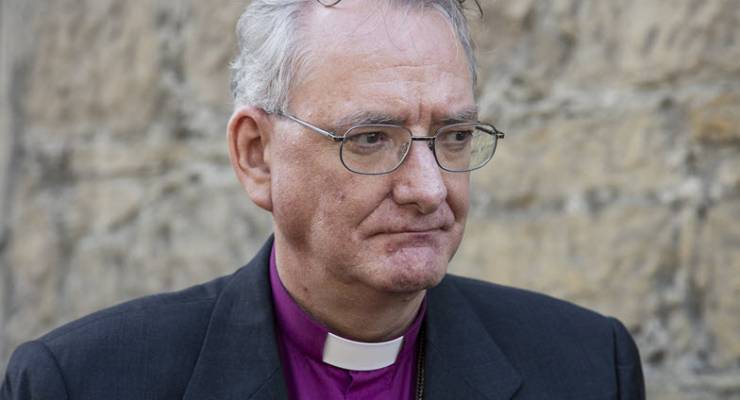
Archbishop of Brisbane Phillip Aspinall
The re-reading of a 13-year-old apology to victims of child sexual assault by the Anglican Church at the royal commission signaled the inertia with which the institution has been plagued for more than a decade, but one senior member of the church admitted more external pressure will be needed for change to happen in the way the church deals with child sexual abuse allegations.
The scripted apology, first made in 2004, heralded four days of confronting evidence for Case Study 52, a hearing of the Royal Commission into Institutional Responses to Child Sexual Abuse, which concluded last week in Sydney.
The final hearing into the Anglican Church by the royal commission investigated causative factors of child sexual abuse and what efforts have been made to eliminate the problem from the church and its institutions.
Stark admissions were made about past failures; humility was expressed by archbishops and bishops in the present; and determination to do better was promised for the future.
“We did not believe those who came forward, and we tried to silence them; we cared more about the church’s reputation than those who had been harmed,” Anglican Synod secretary Anne Hywood told the commission in the apology.
“We have witnessed first-hand the suffering of those who have shared their stories. We have seen in their faces and heard in their voices not only the pain of the abuse they suffered as a child, but the further damage that we inflicted when they came forward as adults, seeking justice and comfort, and we pushed them aside.”
Church leaders gave evidence that child sexual abuse was caused by church culture, lack of supervision of priests and church workers, “cheap” forgiveness, disbelief that clergy or colleagues would offend and lenient sentencing by courts.
Victims who were disbelieved and vilified by church leaders for decades are at last beginning to be vindicated and to gain public respect for their courage.
In the past 15 years, new policies and procedures have been written and re-written and promises of better corporate behaviour have been made. But the wills of the 23 disparate dioceses of the national church are not yet united.
The Archbishop of Brisbane Phillip Aspinall gave evidence that, even now, the Anglican Church has no nationally consistent approach to respond to allegations of child sexual abuse.
“I think we might need an external push over the line,” he told the royal commission. “It seems that at a practical level, we are incapable of putting it in place ourselves.”
The reason for the inertia, he said, was a lack of trust between dioceses.
“I think at root, what impedes our capacity to collaborate is a fundamental lack of trust between the dioceses, to the point where there is a lack of will or even desire to cooperate on a whole range of issues.”
Royal Commissioner Justice Jennifer Coates asked the other members of the panel of church leaders if they agreed with Archbishop Aspinall’s assessment and they all nodded their agreement.
The Anglican Church and its parishes and institutions will need to display a high degree of transparency and accountability for congregations to regain trust in the institution.
Even if they do, it is unlikely that the public can regain that trust — at least in the foreseeable future.
The Anglican Church’s failures were presented first in numbers and statistics that, according to the counsel assisting the commission were an underestimation of the true scale of the abuse.
Even so, the numbers are shocking: 569 offenders were harboured by the Anglican Church and its institutions.
The alleged offenders were clergy, church workers and volunteers: 247 clergy and 285 church workers or volunteers.
Many of the children they harmed were damaged and broken.
More than a thousand survivors who reported alleged crimes between 1980 and 2015 took an average of 29 years to be able to disclose what had been done to them.
Seventy-five percent of the victims were boys and 25% were girls — a reversal of abuse statistics in the general community.
The average age of child victims was 11 years for boys and girls.
The Brisbane diocese — where the national scandal of sexual abuse of children emerged after a court case in 2001 — has been shown to be an epicentre of abuse with 371 complaints of the national total of 1115 reported complaints to 22 of the 23 dioceses.
Despite their divisions, Anglican Primate Philip Freier, the most senior member of the church in Australia, assured the royal commission of his strong resolve to create nationally consistent child protection policies across all dioceses at a national gathering of the church’s general synod in September.
Author disclosure: Amanda Gearing has a relative who is a survivor of clergy abuse.







Crikey is committed to hosting lively discussions. Help us keep the conversation useful, interesting and welcoming. We aim to publish comments quickly in the interest of promoting robust conversation, but we’re a small team and we deploy filters to protect against legal risk. Occasionally your comment may be held up while we review, but we’re working as fast as we can to keep the conversation rolling.
The Crikey comment section is members-only content. Please subscribe to leave a comment.
The Crikey comment section is members-only content. Please login to leave a comment.